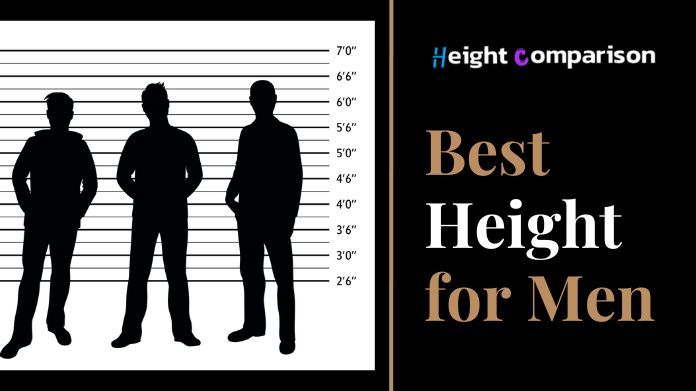The best height for men is subjective and varies based on cultural perceptions, individual preferences, and societal norms. While height can play a role in certain aspects of life, such as sports or specific professions, determining an ideal height for all men is complex and multifaceted.
“What is the Best Height for Men” explores the factors contributing to perceptions of height and its significance in different contexts. From evolutionary perspectives to societal influences, height has been linked to perceptions of attractiveness, leadership qualities, and success in various studies and cultural narratives.
However, it’s crucial to recognize that men have no universally agreed-upon best height. Personal confidence, personality traits, skills, and achievements often outweigh physical height in determining overall success and fulfillment in life.
Join Height Comparison as we navigate the nuances of height perceptions, debunk common myths, and encourage a broader perspective on what truly defines an individual’s value and potential beyond physical attributes.
Let’s delve into the discussion of height and its role in shaping societal ideals and individual experiences.
Men’s Height Influencing Factors
Genetic, environmental, and hormonal factors influence men’s height. Here are some key influences on men’s height:
Genetics
Genetic factors play a significant role in determining an individual’s height. Traits related to height are passed down through genes from parents to offspring. Height heritability estimates suggest that genetics can account for about 60-80% of height variation among individuals.
Nutrition
Adequate nutrition during childhood and adolescence is crucial for optimal growth and development. Malnutrition or nutritional deficiencies during critical growth periods can stunt growth and lead to shorter stature in adulthood.
Hormones
Hormones, particularly growth hormones such as human growth hormone (HGH) and insulin-like growth factor 1 (IGF-1), play a vital role in regulating growth and bone development. Hormonal imbalances or medical conditions affecting hormone production can impact height.
Health Conditions
Certain medical conditions and disorders can affect growth and height. For example, conditions like hypothyroidism, growth hormone deficiency, or genetic disorders such as Turner syndrome or Marfan syndrome can influence height.
Ethnicity and Geographic Location
Ethnicity and geographic location can also influence average height within populations. Different ethnic groups may have distinct genetic predispositions to height, and environmental factors such as nutrition and healthcare access can vary across regions.
Physical Activity and Exercise
Regular physical activity and exercise during childhood and adolescence can support healthy growth and development. Exercise helps strengthen bones, muscles, and overall physical health, which can contribute to optimal height potential.
Social and Economic Factors
Socioeconomic factors, including access to healthcare, quality of nutrition, and living conditions, can impact growth and development. Children from disadvantaged backgrounds may face challenges that affect their overall health and height potential.
Understanding these influencing factors can provide insights into the complexities of height variation among men and underscore the importance of holistic approaches to promote healthy growth and development during childhood and adolescence.
What is the Best Height for Men?

The best height for men is subjective and depends on various factors, including cultural norms, individual preferences, and societal expectations.
While there is no universally accepted ideal height for men, certain factors may influence perceptions of height and its advantages in different contexts:
- Health Considerations: Generally, a balanced height corresponding to a healthy body mass index (BMI) is considered favorable for overall health and well-being.
- Professional Fields: In some professions, such as modeling, athletics, and specific leadership roles, a taller stature may be preferred or advantageous due to aesthetics, physical presence, and perceived authority.
- Social Perceptions: Cultural and societal norms can influence perceptions of attractiveness, confidence, and success related to height. These perceptions may vary across different cultures and communities.
- Personal Preferences: Individual preferences for height in romantic partners or social interactions can also influence perceptions of men’s “best” height.
Ultimately, what matters most is a person’s confidence, skills, character, and achievements rather than physical height. Embracing diversity and recognizing that people come in all shapes and sizes promotes inclusivity and acceptance in society.
What is the Connection Between Weight and Height for Men?
The connection between weight and height for men is often assessed using the Body Mass Index (BMI), a simple measure that relates a person’s weight to their height. BMI is calculated by dividing a person’s weight in kilograms by the square of their height in meters (BMI = weight (kg) / height (m) 2).
The BMI categories for adults are generally as follows:
- Underweight: BMI less than 18.5
- Average weight: BMI 18.5 to 24.9
- Overweight: BMI 25 to 29.9
- Obesity: BMI 30 or higher
While BMI can provide a general indication of whether a person’s weight is proportional to their height, it does not account for factors such as muscle mass, body composition, or individual health conditions. Therefore, BMI should be interpreted cautiously and best used with other health assessments.
Maintaining a healthy weight relative to height is essential for overall health and well-being. It can help reduce the risk of various health conditions, such as heart disease, diabetes, and joint problems.
However, focusing on overall health and lifestyle habits rather than solely on weight and height ratios is essential. Regular physical activity, a balanced diet, and consulting healthcare professionals for personalized advice are key components of maintaining a healthy weight and lifestyle.
Conclusion
The best height for men is a complex and subjective matter influenced by various factors such as cultural norms, individual preferences, and societal expectations.
While height can play a role in certain aspects of life, such as perceived attractiveness, professional opportunities, and social interactions, it is essential to recognize that there is no universally ideal height for men.
Rather than focusing solely on height, emphasis should be placed on overall health, well-being, confidence, and personal development. Diversity in physical attributes is a natural part of human variation, and embracing this diversity promotes inclusivity and acceptance in society.
Ultimately, the best height for men is the one that allows them to lead healthy, fulfilling lives and achieve their goals, regardless of societal standards or perceptions of height. Each individual is unique, and their worth should not be defined by physical characteristics but by their character, skills, and contributions to society.






